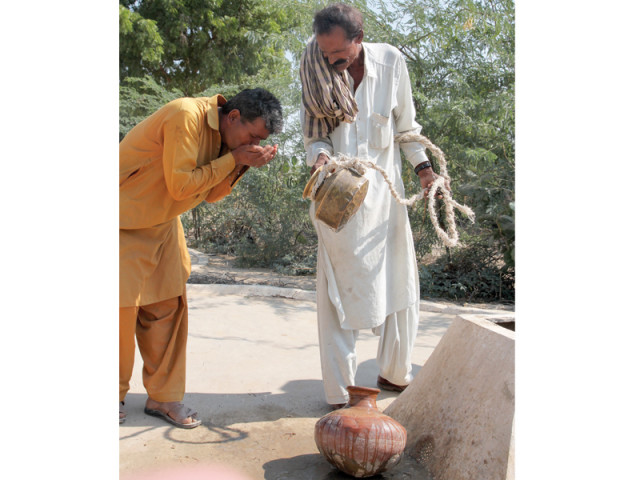Harvesting rainwater: Clean drinking water saves some lives in Thar
Villagers are storing rainwater in man-made ponds which can hold around 30,000 litres of water

There is a village five kilometres away from Mithi Town where, unlike the rest of Tharparkar, no child has died in the last two years.
Medical records and interviews with the residents of the Moori Ji Wandh village show that safe drinking water is what saved their lives in the drought affected area of Mithi, Tharparkar.
“Three children have died in a village next to ours,” said Heero Bheel, a villager. “But we are all fine and healthy. There is no disease here.”
While talking to The Express Tribune, Heero claimed that their children were healthy compared to those living in nearby villages.
“It is because we harvest the rainwater. We store it in this nadi pond [man-made ponds],” he said while pointing towards a small pond which was about four metres deep and has a storage capacity of 30,000 litres. One end of the nadi pond, he said, was closed off with a flat sheet while the other side - which was higher, had a cane on top.
There is a 75mm thick layer of concrete around 1,066 feet catchment of the nadi pond where the rainwater is collected and can be filled up within 30 minutes - even in 70 to 80 mm of rainfall.
“We cover the roof of the pond and install a geometric sheet inside to curb the slow seepage,” said Mukesh Raja, programme coordinator of the Sukkar Foundation, an NGO that has provided the village with 10 nadi ponds. “Each pond provides water to four households for three to four months.” He added that they had around 20 different villages in three talukas of district Tharparkar with these ponds.
Raja claimed that communities in over one hundred villages had been mobilised to start doing this on their own.
“We have introduced another method for the villagers to get clean water,” he said. “Locally we call it chonara pond. It is a large ground water tank and has the storage capacity of at least 50,000 litres.” He added that community based organisations had been formed to look after and maintain the rainwater harvesting systems to ensure that their drinking water demand was met.
While responding to a question about how the lack of rainfall affected this system, Raja said that there was at least 60mm to 100mm rainfall twice a year. He added that while this might not be enough for agricultural purposes, it could be easily used to harvest drinking water.
As word spread, many people in Mithi, Diplo, Islamkot and Chelhar adopted similar rainwater harvesting techniques without any help from the government or NGOs.
“There were around 20 wells near our villages which had contaminated ground water,” said Haresh, a primary school teacher from Deedsar. “Now, three villages have built their own nadi and chora ponds. Each house now gets around five buckets of water.”
According to Haresh, the water doesn’t go bad for months due to the way the ponds are built. He said that this was because they used bio-sand to filter it.
Water woes
Ali Akbar Rahimoon, a social activist from Tharparkar claimed that there was a great potential to harvest rain water in the area but due to the unavailability of a structure or awareness about water conservation, the villagers would not be able to do it. He said that while some organisations had run successful pilot projects it was primarily the government’s responsibility.
According to Rahimoon, the World Health Organisation (WHO) has set a limit according to which a person cannot drink more than 1.5mg of fluoride per litre but they were forced to drink water with high levels of fluoride toxicity.
According to a research study conducted by the Pakistan Council for Research in Water Resources, the total domestic water need for Thar equals to 0.25 per cent of the total annual rainfall in the area. This means that there is need to improve the capacity to harvest it.
Published in The Express Tribune, December 12th, 2014.


















COMMENTS
Comments are moderated and generally will be posted if they are on-topic and not abusive.
For more information, please see our Comments FAQ